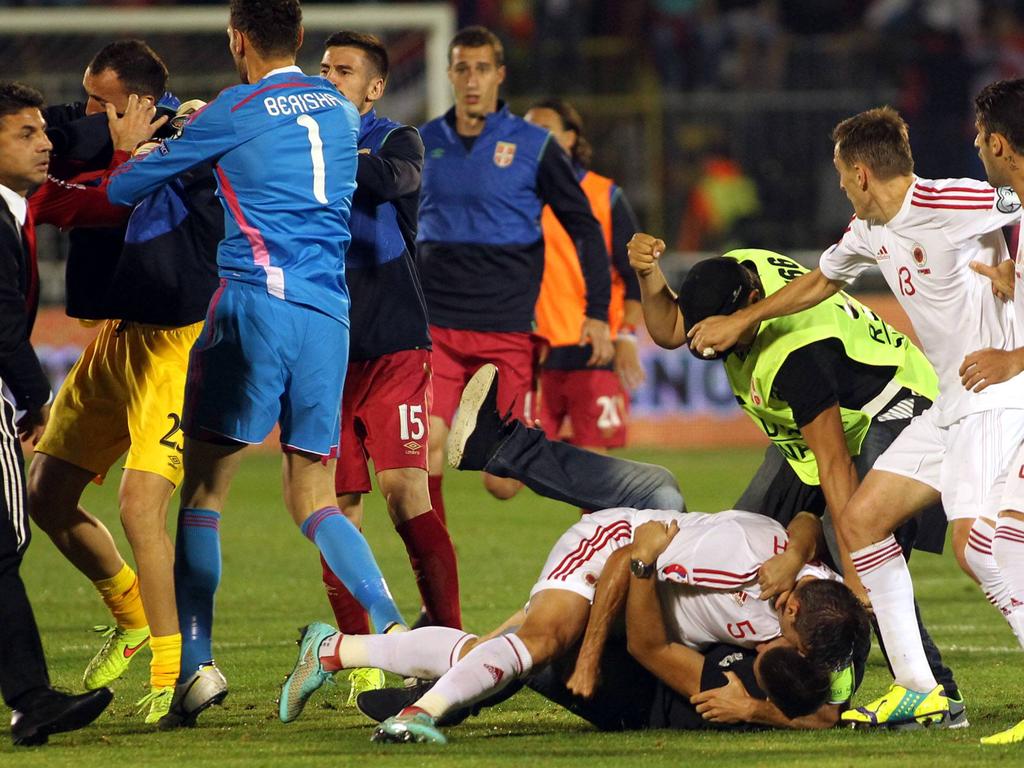Both Serbia, Albania hope for favourable UEFA ruling

Both Serbia and Albania are hoping for a favourable ruling from UEFA when European football's governing body meets Thursday over the violence that halted the Balkan rivals' Euro 2016 qualifier last week.
Both countries blame each other for the trouble at the match which then escalated into an unprecedented political crisis.
Serbia could be held responsible for several issues linked with the organisation of the October 14 game, notably since Serbian fans invaded the pitch to attack Albanian players in Belgrade on October 14.
On the other hand, Albania should answer for its refusal to continue playing the match despite, as Serbia's Football Federation (FSS) claims, an UEFA recommendation to do it as well as for deployment of an illegal flag.
For FSS the violence was provoked by a drone that carried a flag with the map of a 'Greater Albania', a nationalist project aimed at gathering all Albanian communities in the Balkans in one state.
"To display a 'Greater Albania' map in Belgrade is equivalent to displaying Hitler's portrait to Jews," commented Zeljko Petrovic, an assistant to Serbia's Dutch coach Dick Advocaat, explaining the fury of the public in Belgrade.
For Belgrade the incident was a "planned political provocation" aimed at interrupting the game.
FSS wants the Euro qualifier to be registered as a 3-0 victory for Serbia and said it would not comment on the issue before UEFA announces its decision.
Meanwhile, Albanian Football Association called for a "full and independent investigation into incidents that occurred before, during and after the match" abandoned in the 41st minute with the score at 0-0.
Albanian FA said that their squad's bus was pelted with stones while heading to the Partizan stadium.
A chunk of concrete, stones, coins and lighters were hurled at Albania's players and officials before and during the match, it said.
Albanian FA also claimed that when the violence escalated, their players were beaten with fists as well as with chains and stressed that Serbia fans chanted "Death to Albanians!" and "Kill Albanians!"
"Albania's team did not refuse to continue the game, it is the extreme violence ... of Serbian fans that made it impossible to play the match," the Albanian FA lawyer Artan Hajdari told AFP.
No representatives from the two federations were expected at Thursday's hearing of UEFA's disciplinary committee and no announcement of any punishment would be made before Friday.
Meanwhile, a week after the incident, there was still no official explanation about the appearance of the drone over the stadium.
Serbian Prime Minister Aleksandar Vucic only said Friday that an investigation into the incident was advancing.
Serbian authorities will present "uncontestable facts" on the incident as well as on its "very serious planning aimed at humiliating Serbia and provoking unrest," he said.
On the night of the match, Belgrade accused the brother of Albanian Prime Minister Edi Rama of controlling the drone from his seat in the stadium's executive box.
But Olsi Rama, who later returned to Tirana with the Albanian team to a hero's welcome, denied the claims.
The violence was followed by an outbreak of nationalist tensions.
Hooligans attacked several ethnic-Albanian owned shops in Serbia, notably in the northern town of Novi Sad. A Molotov cocktail was thrown into one bakery, while several others had their windows broken, local media reported.
In Tirana, on social networks a call for a protest was launched to ask from UEFA "not to tolerate racism, Albanophobia and xenophobia" of the Serbian side.
The incident aggravated political crisis and Rama's historic visit to Belgrade, the first of an Albanian prime minister in 68 years, that was originally scheduled for Wednesday, was eventually postponed to November 10.
Serbs and Albanians in the region maintain ever hostile relations due to historical and recent disputes like Kosovo, the former Serbian province mostly populated by Albanians, unilaterally declared independence in 2008.








